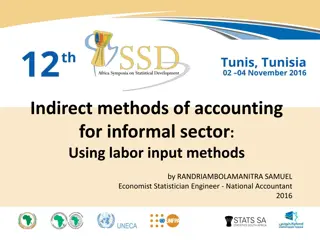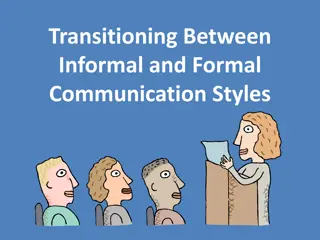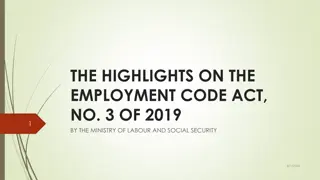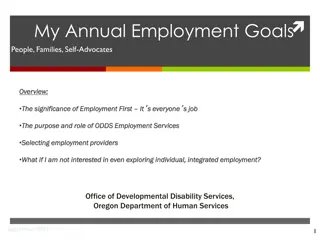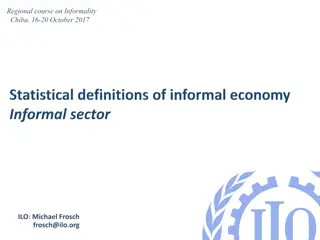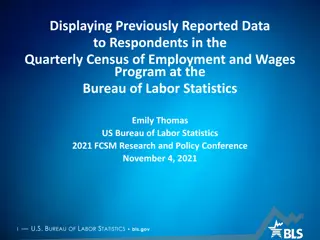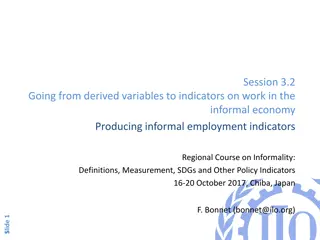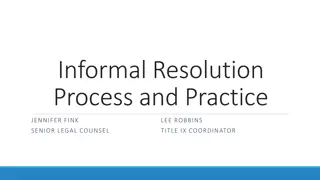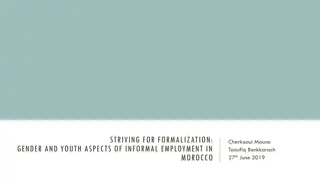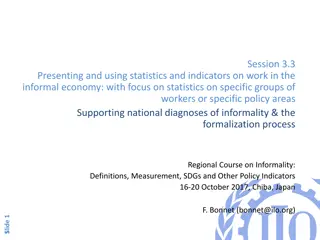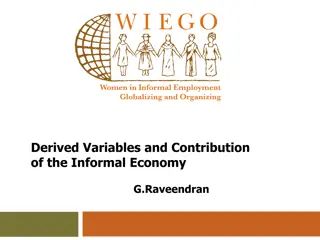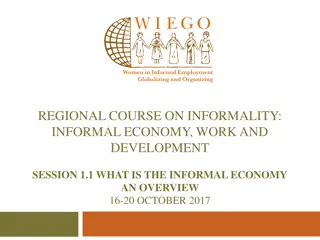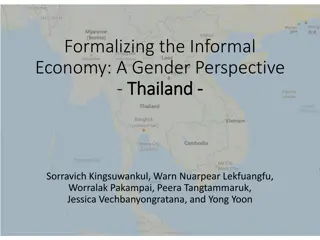Understanding Informal Employment: Key Concepts and Definitions
Exploring the guidelines and definitions surrounding informal employment as endorsed by the 17th ICLS in 2003. This includes the scope of informality, essential components of informal jobs, characteristics of work relationships, and distinguishing between formal and informal sectors. The concept of informal employment is intricately linked to the nature of work relationships and production units.
Download Presentation

Please find below an Image/Link to download the presentation.
The content on the website is provided AS IS for your information and personal use only. It may not be sold, licensed, or shared on other websites without obtaining consent from the author. Download presentation by click this link. If you encounter any issues during the download, it is possible that the publisher has removed the file from their server.
E N D
Presentation Transcript
Informal employment 17 th ICLS Guidelines concerning a statistical definition of informal employment Endorsed by the 17th ICLS, 2003 Complements the 15 th ICLS resolution concerning statistics of employment in the informal sector Expands the scope of informality beyond the informal sector Informal employment Informal sector
Towards an statistical definition Definition of informal employment Informal employment comprises the total number of informal jobs Not a conceptual definition Defined by its components
Three essential components The concept of informal job has three essential components Characteristic of the work relationship Employment Based on the 13 th ICLS definition but now replaced with the 19 th ICLS The definition of Informal Structured around the International Classification of Status in Employment (ICSE-93)
Characteristic of the work relationship Job based concept A person can have one or more informal and/or formal jobs A person is in informal employment if at least one of the jobs are informal However; SDG 8.3.1 informal employment is defined as informal employment in main job Can be carried out in any kind of production unit Formal sector unit Informal sector unit Household unit
INFORMAL SECTOR FORMAL SECTOR INFORMAL EMPLOYMENT HOUSEHOLD UNITS
Employment Employment as previous defined in the 13 th ICLS resolution includes Persons that work in exchange of a remuneration Own use producers of goods Conceptually; Unpaid work (unpaid trainees, volunteers, etc.) With the 19 th ICLS this is now regarded as different forms of work
Definition of informal employment and ICSE-93 Whether a job is informal or not depends on the characteristics of the work relationship Employers, Own-account workers and Members of producers cooperatives; relies on the characteristics of the production unit no clear separation between the production unit and the job in informal sector units Employees and contributing family workers; relies on the characteristics of the job have an employment relationship that can be characterised as either formal or informal independently on the production unit
ICSE-93 If the production unit is an informal sector unit then the job is defined as informal Contributing family workers and employees are defined on the basis of Own-account workers, employers and MPC are defined on the basis of the characteristics of the production unit the characteristics of the job Employees can have informal or formal jobs in all types of production units Own use production of goods exclusively for own final use is per definition an informal job Contributing family workers have per definition an informal job
Definition of an informal job Employers, Own account workers, and MPC Employees Contributing family workers The economic unit is informal or a household ALL ?
17th ICLS guidelines Employees are considered to have informal jobs if their employment relationship is not subject, in law or in practice to a) national labour legislation b) income taxation c) social protection d) entitlement to certain benefits (advance notice of dismissal, severance pay, paid annual or sick leave, etc.)
Informal employees: Not subject to national labour legislation National labour legislation regulates the right to A decent (minimum) wage Regulated hours of work Weekly rest Organize and negotiate Annual leave Sick leave (paid or unpaid) Protection against abusive dismissal Severance pay Etc. Existence of a written contract is often used to identify employees who are subject to national labour legislation. But it is not necessarily a good proxy. Beware!
Informal employees: Not subject to income taxation We can be sure that if the employer deduct income tax, the job is formal They are reporting to the government But if the employee does not declare earnings of the job, it may be because it is not required by national law For example, because tax is deducted directly only from earnings as of a certain amount We cannot be certain that the job is informal This criterion might be useful to exclude evident cases of formal jobs, but not to identify informal jobs directly!
Informal employees: Not subject to social protection Social protection provides social benefits to the population Old age, sickness, maternity, unemployment, accidents, etc. Usually, a fixed share is deducted from earnings from each job (social insurance) If contributions are deducted from earnings, they are formal But there might be cases when the criteria is less meaningful: Universal system (Not related to the job) The social protection system is to basic within the country There are no programs available for all types of employees (Only government employees are covered) Even for employees covered, services are too basic and they cannot really benefit from them
Informal employees: Not subject to certain employment benefits Benefits mentioned in the standards Advance notice of dismissal Severance pay Access to paid annual leave or compensation for it Access to paid sick leave These two criteria are the most commonly used as a complement to social protection It is better to identify whether the employee is actually able to enjoy these rights than whether they theoretically have the right to do so
Other possible criteria* Written contract Only if it implies labour legislation coverage. But beware that may not be relevant if employees may not actually enjoy benefits/protection by labour legislation May not be relevant if even government employees do not have a written contract Casual/temporary nature of job Useful when labour legislation does not cover employees in these situations But beware that there may be employees in permanent jobs that may also be informal Low working hours or low wages Useful when workers in these situations are not expected to contribute to social security systems, to pay taxes or to enjoy any work benefits * These criteria cannot be used to define the informal employment but may be used when information on main criteria is not available
Informal employees The relevance of the criteria's needs to be evaluated within the context of the specific country Type of social protection system Universal/job-dependent? Voluntarily/obligatory Very basic or well developed? Labour legislation Are all employees supposed to have access to paid sick leave or paid annual leave? Sometimes they might have access to vacation or to sick leave but not paid How does the different criteria's correlate with each other Is the correlation between e.g. Social protection, paid sick leave, pad annual leave in general strong or weak?
Definition of informal jobs Employers, Own account workers, and MPC Employees Contributing family workers The economic unit is informal or a household ALL The employment relationship (job) is, in law or in practice, ? not subject to one or more of the following: (a) National labour legislation; (b) Income taxation; (c) Social protection; (d) Entitlement to certain employment benefits (advance notice of dismissal, severance pay, annual leave, sick leave, etc.)
Employment in the informal sector Informal employment Employment in the informal Economy
Joint analysis of informal sector units and informal jobs Production units Informal jobs Formal jobs Informal sector enterprises Other units of production A B C D Employment in the informal sector: A + B Informal employment: A + C Employment in the informal economy: A + B + C The identification of the informal sector is crucial in all concepts 20
COMPONENTS OF FORMAL AND INFORMAL EMPLOYMENT
Formal sector entrepreneurs (own account workers, employers and MPC in the formal sector) Employment in the INFORMAL SECTOR Employeesin the informal sector who Employed in the FORMALSECTOR INFORMAL EMPLOYMENT Informal sector entrepreneurs (Own account workers, employers and MPC in the informal sector) have formal jobs Employeesin the formal sector who have informal jobs Employeesin the formal sector who have formal jobs Employeesin the informal sector who have informal jobs Contributing family workers and other unpaid workers in the formal sector Contributing family workers and other unpaid workers in the informal sector Own account workers in households producing goods exclusively for own final use Domestic employeeswho have informal jobs HOUSEHOLDS Domestic employeeswho have formal jobs Employed in
QUIZZZ Workers with informal job can only work in the informal sector Domestic employees can only have informal jobs Contributing family workers will have a formal job if they have right to vacations Contributing family workers in the formal sector have formal jobs Informal sector entrepreneurs always have informal jobs YES!! NO!! NO!! NO!! NO!!


